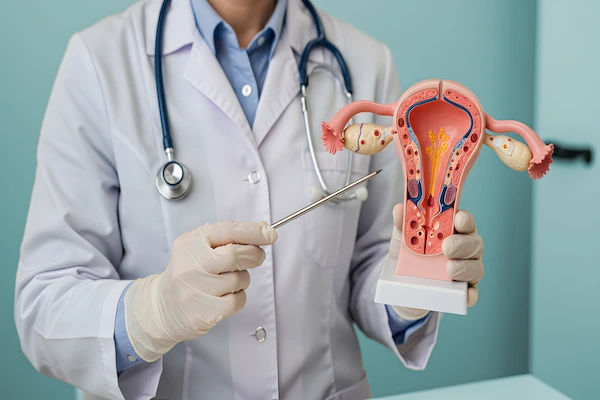PCOS and Diabetes: The Critical Link and How to Stay Healthy
Get a clear guide to emergency contraception, including its types, timing, and effectiveness, to make informed decisions about your reproductive health.

Written by
Last updated on 13th Jan, 2026

Introduction
If you're among the millions of women managing Polycystic Ovary Syndrome (PCOS), you've likely heard about its connection to diabetes. But what does that really mean for your health? This intricate link, primarily driven by insulin resistance, is the most significant long-term health concern for those with PCOS. Understanding this relationship isn't about fostering fear—it's about empowerment. This guide will demystify the connection between PCOS and diabetes, providing you with clear, actionable steps to assess your risk, take preventive measures, and protect your long-term metabolic health. We'll explore the science behind the symptoms, outline essential tests, and offer practical diet and lifestyle strategies to help you stay in control of your well-being.
What Are PCOS and Diabetes?
What is Polycystic Ovary Syndrome (PCOS)?
PCOS is a common hormonal disorder affecting people of reproductive age. It's characterized by a combination of symptoms that may include irregular or absent menstrual periods, excess androgen (male hormone) levels leading to hirsutism (unwanted hair growth) and acne, and polycystic ovaries visible on an ultrasound. However, it's crucial to understand that PCOS is fundamentally a metabolic disorder at its core, with insulin resistance playing a starring role.
What is Type 2 Diabetes?
Type 2 diabetes is a chronic condition that affects the way your body processes blood sugar (glucose). In a healthy body, the hormone insulin helps glucose enter your cells to be used for energy. In type 2 diabetes, your cells become resistant to the effects of insulin, and your pancreas can't make enough insulin to overcome this resistance. This leads to high levels of glucose circulating in your blood, which can cause serious damage to nerves, blood vessels, and organs over time. The stage before full-blown diabetes is called prediabetes, where blood sugar levels are higher than normal but not yet high enough for a diabetes diagnosis.
Why PCOS Increases Diabetes Risk?
This is the key to the entire puzzle. Insulin resistance is a condition where your body's cells don't respond effectively to insulin. To compensate, your pancreas produces even more insulin to try to lower blood glucose levels. This state of hyperinsulinemia (high insulin levels) is present in a vast majority of women with PCOS, regardless of their weight.
This excess insulin doesn't just affect blood sugar; it wreaks havoc on your ovaries. It prompts them to produce more testosterone, which disrupts follicle development and ovulation, leading to the classic symptoms of PCOS like irregular periods and infertility. Essentially, insulin resistance is the engine driving both the metabolic and reproductive features of PCOS.
How Hormonal Imbalance Fuels the Problem?
The high insulin and testosterone levels create a vicious cycle. The hormonal imbalance makes it easier to gain weight, particularly around the abdomen (visceral fat). This abdominal fat is highly metabolically active and further exacerbates insulin resistance. This cycle of insulin resistance -> weight gain -> worsened insulin resistance significantly amplifies the risk of progressing from insulin resistance to prediabetes and, ultimately, to type 2 diabetes. Studies show that women with PCOS are at least four times more likely to develop type 2 diabetes than women without PCOS.
Consult Top Obstetrician and Gynaecologist
Recognising the Signs: Symptoms of Insulin Resistance in PCOS
While not every woman with insulin resistance has obvious symptoms, many experience tell-tale signs.
Common Physical Indicators
Acanthosis Nigricans: Dark, velvety patches of skin, often on the neck, in the armpits, or in the groin area. This is a classic visual marker of insulin resistance.
Skin Tags: Small, fleshy growths that frequently appear in the same areas as acanthosis nigricans.
Intense Cravings: Powerful cravings for carbohydrates and sugary foods, as your body's cells are starved of energy despite high blood sugar.
Difficulty Losing Weight: A persistent struggle to lose weight despite diet and exercise efforts.
Less Obvious Signs to Watch For
Fatigue: Feeling unusually tired, especially after meals high in carbohydrates.
Brain Fog: Difficulty concentrating or feeling mentally cloudy.
Hunger Soon After Eating: Not feeling satiated for long after a meal.
Are You at Risk? Key Factors for Developing Diabetes with PCOS
While all women with PCOS have an elevated risk, certain factors compound it:
Family History: Having a parent or sibling with type 2 diabetes.
Body Weight: A BMI over 30, particularly with weight carried around the abdomen.
Sedentary Lifestyle: Lack of regular physical activity.
Unhealthy Diet: A diet high in processed foods, sugars, and unhealthy fats.
Age: Risk increases as you get older.
History of Gestational Diabetes: Having diabetes during a previous pregnancy.
If one or more of these factors apply to you, it's especially important to be proactive about screening and prevention. If your condition does not improve after trying lifestyle methods, book a physical visit to a doctor with Apollo24|7 for a comprehensive risk assessment.
How to Test for and Diagnose Prediabetes?
Early detection of prediabetes is critical because it's a reversible condition. You should be screened regularly if you have PCOS.
Essential Blood Tests Your Doctor Might Order
HbA1c (Glycated Hemoglobin): This test provides a snapshot of your average blood sugar levels over the past 2-3 months. An HbA1c level between 5.7% and 6.4% indicates prediabetes.
Fasting Blood Glucose: This measures your blood sugar after an overnight fast. A level between 100 mg/dL and 125 mg/dL suggests prediabetes.
Oral Glucose Tolerance Test (OGTT): This involves drinking a sugary liquid and having your blood sugar tested fasting and then again two hours later. It's a very sensitive test for catching how your body handles a glucose load.
Apollo24|7 offers convenient home collection for tests like HbA1c and fasting glucose, making it easier to stay on top of your metabolic health.
Get Your Health Assessed
Your Action Plan: Preventing and Managing Diabetes with PCOS
The good news is that the same strategies that manage PCOS also dramatically reduce your diabetes risk.
The Foundation: A PCOS-Friendly Diet for Blood Sugar Control
The goal is to choose foods that cause a slow, steady rise in blood sugar rather than a sharp spike.
Foods to Embrace:
High-Fiber Vegetables: Leafy greens, broccoli, cauliflower, bell peppers.
Lean Protein: Chicken, fish, tofu, lentils, and legumes. Protein helps with satiety and stabilizes blood sugar.
Healthy Fats: Avocado, nuts, seeds, and olive oil. Fats slow down the absorption of carbohydrates.
Complex Carbohydrates: Whole grains like quinoa, oats, and brown rice in moderation.
Foods to Limit or Avoid:
Refined Carbohydrates: White bread, pasta, pastries, and white rice.
Sugary Drinks: Sodas, juices, and sweetened coffees.
Highly Processed Foods: These often contain hidden sugars and unhealthy fats.
The Power of Movement: Exercise for Insulin Sensitivity
Physical activity is like a natural medication for insulin resistance. It helps your muscles use glucose more effectively without needing as much insulin.
Aim for a mix: Combine aerobic exercise (like brisk walking, swimming, or cycling for 30 minutes most days) with strength training (2-3 times per week). Building muscle mass increases your body's glucose-burning machinery.
Weight Management Strategies That Work
Even a modest weight loss of 5-10% of your body weight can significantly improve insulin sensitivity, restore ovulation, and reduce diabetes risk. Focus on sustainable changes rather than drastic diets.
Medications and Supplements That Can Help
Metformin: This common diabetes drug is often prescribed off-label for PCOS. It improves insulin sensitivity and can help with menstrual regularity and weight management.
Inositol: A B-vitamin-like compound that has been shown in studies to improve insulin resistance, ovarian function, and metabolic profiles in women with PCOS. It's available as a supplement.
Other Medications: Your doctor may also discuss other options like GLP-1 receptor agonists if appropriate.
Always consult a doctor before starting any new medication or supplement regimen.
Long-Term Health: Monitoring and Maintaining Wellness
Managing PCOS and diabetes risk is a marathon, not a sprint. Regular check-ups with your doctor, including annual blood tests to monitor your HbA1c, cholesterol, and blood pressure, are essential. Building a sustainable routine of healthy eating and enjoyable physical activity is the most powerful long-term strategy for protecting your health.
Conclusion
Living with PCOS requires a proactive approach to your health, particularly regarding your metabolic well-being. While the statistics linking PCOS and diabetes can seem daunting, they should be viewed as a motivator for positive change. You have a tremendous amount of control over your health trajectory. By understanding the role of insulin resistance, adopting a blood-sugar-friendly lifestyle, and partnering with your healthcare team for regular monitoring, you can significantly reduce your risk of diabetes and other complications. This journey is about empowerment, taking one step at a time to build a healthier, vibrant future for yourself. If symptoms persist or you need guidance on where to start, consult a doctor online with Apollo24|7 for further evaluation and a tailored management plan.
Consult Top Specialists
Consult Top Obstetrician and Gynaecologist

Dr. Mona Yadav
Obstetrician and Gynaecologist
19 Years • MBBS, MD (Obstetrics & Gynaecology)
Dombivli
Nulife multispeciality, Dombivli

Dr. Ramya G S
Obstetrician and Gynaecologist
11 Years • MBBS, DGO - Obstetrics & Gynaecology, DNB - Obstetrics & Gynaecology
Bengaluru
Apollo Clinic, JP nagar, Bengaluru

Dr. Soumya P
Obstetrician and Gynaecologist
6 Years • MBBS,MS (OBST & GYNAE)
Bengaluru
Apollo Clinic, JP nagar, Bengaluru

Dr. Divyashree S
Obstetrician and Gynaecologist
7 Years • MBBS, MS (OBG)
Bengaluru
Apollo Clinic, JP nagar, Bengaluru

Dr. Harshitha B R
Obstetrician and Gynaecologist
11 Years • MBBS, DGO( OBS & GYN)
Bengaluru
Apollo Clinic, JP nagar, Bengaluru
Consult Top Specialists

Dr. Mona Yadav
Obstetrician and Gynaecologist
19 Years • MBBS, MD (Obstetrics & Gynaecology)
Dombivli
Nulife multispeciality, Dombivli

Dr. Ramya G S
Obstetrician and Gynaecologist
11 Years • MBBS, DGO - Obstetrics & Gynaecology, DNB - Obstetrics & Gynaecology
Bengaluru
Apollo Clinic, JP nagar, Bengaluru

Dr. Soumya P
Obstetrician and Gynaecologist
6 Years • MBBS,MS (OBST & GYNAE)
Bengaluru
Apollo Clinic, JP nagar, Bengaluru

Dr. Divyashree S
Obstetrician and Gynaecologist
7 Years • MBBS, MS (OBG)
Bengaluru
Apollo Clinic, JP nagar, Bengaluru

Dr. Harshitha B R
Obstetrician and Gynaecologist
11 Years • MBBS, DGO( OBS & GYN)
Bengaluru
Apollo Clinic, JP nagar, Bengaluru
More articles from Polycystic ovary syndrome
Frequently Asked Questions
Can you have PCOS without insulin resistance?
While the majority of women with PCOS (up to 70-80%) have some degree of insulin resistance, it is possible to have a diagnosis of PCOS without it, especially in leaner individuals. However, insulin resistance is considered a core feature for most.
Does having PCOS mean I will definitely get diabetes?
No, it does not mean it's inevitable. It means you are at a significantly higher risk. This increased risk is a powerful incentive to adopt preventive lifestyle measures. With proactive management, many women with PCOS successfully prevent the onset of type 2 diabetes.
What is the best exercise for insulin resistance in PCOS?
A combination of aerobic exercise (like brisk walking, cycling) and resistance/strength training (using weights, resistance bands, or bodyweight exercises) is most effective. Strength training is particularly important as it builds muscle mass, which improves your body's ability to use glucose.
How often should I get tested for diabetes if I have PCOS?
It's generally recommended that women with PCOS have their blood sugar levels (via HbA1c or fasting glucose) checked at least once a year. Your doctor may suggest more frequent testing if you have additional risk factors or if your previous tests showed prediabetes.
Are there specific vitamins for PCOS and insulin resistance?
Yes, some supplements have shown promise. Inositol is the most researched and is known to improve insulin sensitivity. Vitamin D deficiency is also common in PCOS and supplementing may help improve metabolic parameters. Always talk to your doctor before starting any new supplements.

